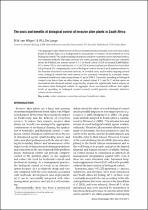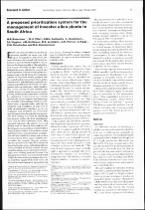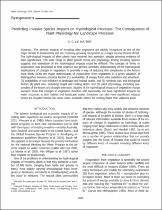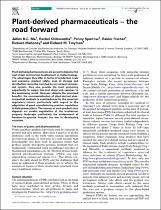 ResearchSpace
ResearchSpace
Costs and benefits of biological control of invasive alien plants in South Africa
JavaScript is disabled for your browser. Some features of this site may not work without it.
- ResearchSpace
- →
- Research Publications/Outputs
- →
- Journal Articles
- →
- View Item
| dc.contributor.author |
Van Wilgen, BW

|
|
| dc.contributor.author |
De Lange, Willem J

|
|
| dc.date.accessioned | 2011-10-27T09:32:56Z | |
| dc.date.available | 2011-10-27T09:32:56Z | |
| dc.date.issued | 2011-08 | |
| dc.identifier.citation | Van Wilgen, BW and De Lange, WJ. 2011. Costs and benefits of biological control of invasive alien plants in South Africa. African Entomology, Vol 19(2), pp 504-514 | en_US |
| dc.identifier.issn | 1021-3589 | |
| dc.identifier.uri | http://www.bioone.org/doi/abs/10.4001/003.019.0228 | |
| dc.identifier.uri | http://hdl.handle.net/10204/5260 | |
| dc.description | Copyright: 2011 Entomological Society of Southern Africa. Special permission to self archive this article has been granted by the publisher and copyright owner 'Entomological Society of Southern Africa' | en_US |
| dc.description.abstract | This paper provides a brief review of the environmental and economic costs of invasive alien plants in South Africa as a background to assessments of returns on investment in weed biological control. The understanding of impacts and their economic costs is far from perfect, but estimates indicate that some costs (of lost water, grazing and biodiversity) are currently about R6.5 billion per annum (about 0.3 % of South Africa’s GAP of around R2000 billion: R7=about US$1), and could rise to >5% of GDP if invasive plants are allowed to reach their full potential. By comparing the costs of biological control research and implementation to the benefits of restored ecosystem services, or avoided costs, and avoided ongoing control costs, biological control has been shown to be extremely beneficial in economic terms: estimated benefit: cost ratios ranged from 8:1 up to 3726:1. Currently, spending on biological control is far lower than on other forms of control (about 5 % and 14 % of that spent on mechanical and chemical control, respectively), despite the significantly better returns on investment from biological control. In aggregate these assessments indicate that higher levels of spending on biological control research would generate extremely attractive returns on investment. | en_US |
| dc.language.iso | en | en_US |
| dc.publisher | Entomological Society of Southern Africa | en_US |
| dc.relation.ispartofseries | Workflow request;7384 | |
| dc.subject | Water resources | en_US |
| dc.subject | Ecosystem services | en_US |
| dc.subject | Invasive alien plants | en_US |
| dc.subject | Alien plants | en_US |
| dc.subject | Weed control | en_US |
| dc.subject | South African invasive plants | en_US |
| dc.subject | South African alien plants | en_US |
| dc.title | Costs and benefits of biological control of invasive alien plants in South Africa | en_US |
| dc.type | Article | en_US |
| dc.identifier.apacitation | Van Wilgen, B., & De Lange, W. J. (2011). Costs and benefits of biological control of invasive alien plants in South Africa. http://hdl.handle.net/10204/5260 | en_ZA |
| dc.identifier.chicagocitation | Van Wilgen, BW, and Willem J De Lange "Costs and benefits of biological control of invasive alien plants in South Africa." (2011) http://hdl.handle.net/10204/5260 | en_ZA |
| dc.identifier.vancouvercitation | Van Wilgen B, De Lange WJ. Costs and benefits of biological control of invasive alien plants in South Africa. 2011; http://hdl.handle.net/10204/5260. | en_ZA |
| dc.identifier.ris | TY - Article AU - Van Wilgen, BW AU - De Lange, Willem J AB - This paper provides a brief review of the environmental and economic costs of invasive alien plants in South Africa as a background to assessments of returns on investment in weed biological control. The understanding of impacts and their economic costs is far from perfect, but estimates indicate that some costs (of lost water, grazing and biodiversity) are currently about R6.5 billion per annum (about 0.3 % of South Africa’s GAP of around R2000 billion: R7=about US$1), and could rise to >5% of GDP if invasive plants are allowed to reach their full potential. By comparing the costs of biological control research and implementation to the benefits of restored ecosystem services, or avoided costs, and avoided ongoing control costs, biological control has been shown to be extremely beneficial in economic terms: estimated benefit: cost ratios ranged from 8:1 up to 3726:1. Currently, spending on biological control is far lower than on other forms of control (about 5 % and 14 % of that spent on mechanical and chemical control, respectively), despite the significantly better returns on investment from biological control. In aggregate these assessments indicate that higher levels of spending on biological control research would generate extremely attractive returns on investment. DA - 2011-08 DB - ResearchSpace DP - CSIR KW - Water resources KW - Ecosystem services KW - Invasive alien plants KW - Alien plants KW - Weed control KW - South African invasive plants KW - South African alien plants LK - https://researchspace.csir.co.za PY - 2011 SM - 1021-3589 T1 - Costs and benefits of biological control of invasive alien plants in South Africa TI - Costs and benefits of biological control of invasive alien plants in South Africa UR - http://hdl.handle.net/10204/5260 ER - | en_ZA |








